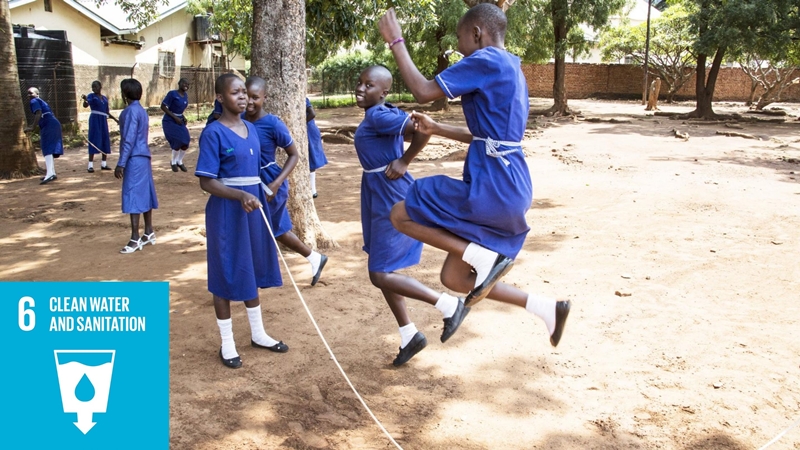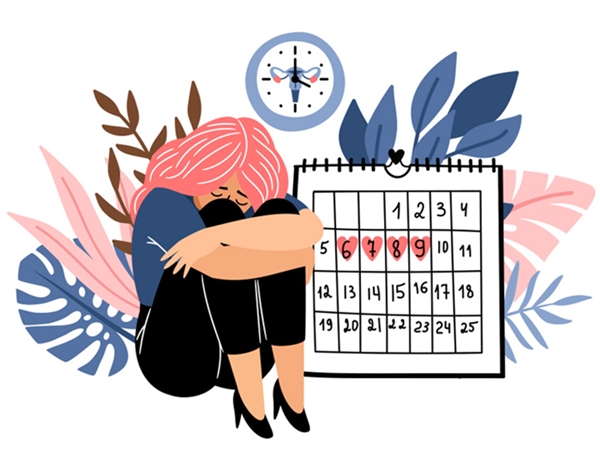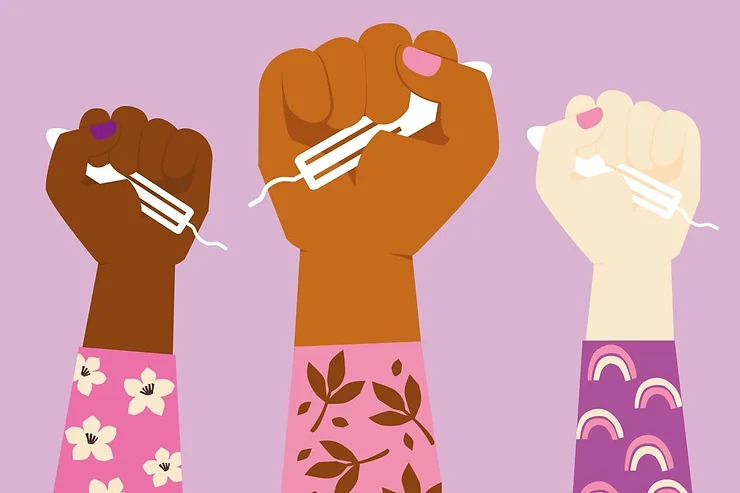Period poverty is defined as a lack of access to menstrual products, hygiene facilities, waste management, and education.
―
Q. What is period poverty?
―

Source : the Chatty Gal
A. Period poverty is defined as a lack of access to menstrual products, hygiene facilities, waste management, and education.
Women who cannot afford basic hygiene products, especially young girls, are ashamed to ask for help with their menstruation. Because of the stigma against menstruation that views periods as unhygienic, women and girls without any education and support are left with a sense of shame and isolation. And they often think that this is inevitable.
Period poverty is very real in underdeveloped countries. Without access to sanitary products, many women improvise with socks, old blankets, newspapers, chicken feathers, mud, or even cow dung. Period poverty not only places undue shame on women but also erodes their dignity.
A girl’s menstruation is a natural biological process and a symbol of entering womanhood. However, countless girls worldwide face significant challenges in their lives due to the pervasive social stigma and inherent shame linked to menstruation.
Source: United Nations
―
8 key facts about menstruation
―
Menstruation is a natural and essential aspect of a woman’s life, experienced by approximately half of the world’s female population within the reproductive age range of 15 to 49 years. Typically lasting from 2 to 7 days each month, menstruation accounts for an average of about 7 years of a woman’s lifetime. However, the pervasive stigma surrounding menstruation presents significant challenges for women and girls.
The absence of adequate information about menstruation can result in misunderstandings, discrimination, and hinder girls from engaging in typical childhood experiences and activities. Here are eight essential facts about menstruation. (Source: UNICEF)
1. On average a woman menstruates about 7 years during their lifetime.
2. The first period can be met with either celebration, fear or concern. For every girl, this signifies an important transition to womanhood – a time when they would benefit from the support of family and friends.
3. Many girls do not have complete and accurate understanding of menstruation as a menstruation as a normal biological process. Educating girls before their first period - and, importantly, boys - on menstruation, builds their confidence, contributes to social solidarity and encourages healthy habits. Such information should be provided at home and at school.
4. Poor menstrual hygiene can pose physical health risks and has been linked to reproductive and urinary tract infections. Providing access to private facilities with water and safer low-cost menstrual materials could reduce urogenital diseases.
5. Girls and women with disabilities and special needs face additional challenges with menstrual hygiene and are affected disproportionately with lack of access to toilets with water and materials to manage their period.
6. Many women and girls do not have access to materials to manage their menstruation, especially in times of emergency, such as natural disasters and conflicts. They need aid kits including sanitary pads, a flashlight and whistle for personal safety when using the toilet.
7. Globally, more than 2 billion people lack basic sanitation services and in Least Developed Countries only 27% of the population has a handwashing facility with water and soap at home. Managing periods at home is a major challenge for women and adolescent girls who lack these basic facilities at home.
8. About half of the girls the schools in low-income countries lack adequate drinking water, sanitation and hygiene crucial for girls and female teachers to manage their period. Inadequate facilities can affect girls’ experience at school, causing them to miss school during their period. All schools should provide running water, safe and clean toilets for adolescent girls.

Source: Menstrual hygiene | UNICEF
―
Q. Why is it important to address period poverty?
―

“I’m reluctant to go to school
because my period might leak,
and I’m scared I may be bullied.”
In many low-income countries, period poverty forces many girls to discontinue their education.
These girls, particularly in underdeveloped regions, lack access to essential hygiene products. Odors and leakage become a challenge and for school girls, it can lead to being absent or even dropping out of school.
In the Gambia, Africa’s smallest country, period poverty is a widespread issue, especially prevalent in rural areas. According to the United Nations Population Fund (UNFPA), many girls miss up to five days of school each month due to the lack of sanitary products and adequate sanitation facilities.
This exacerbates gender inequality, as those who drop out of school face difficulties in securing decent jobs. When they do find work, it often involves low-paying jobs, leading to increased poverty levels.
In essence, period poverty is a pressing concern intertwined with women’s independence and human rights.
Subpar menstrual health and hygiene undermine the fundamental rights of women and girls, including their right to education and employment, further intensifying social and economic inequalities.
―
Putting an end to period poverty
―

Source: United Nations Population Fund (UNFPA)
Girls at St. John’s School for the Deaf in Banjul, The Gambia, get free distribution of reusable sanitary pads.
Menstruation is a natural process experienced by more than half of the world’s population, and it’s where poverty becomes a widespread issue. Effectively addressing period poverty demands innovative solutions and collaboration across various sectors to guarantee access to clean water and sanitation.
The United Nations Population Fund(UNFPA) engages in four approaches aimed at promoting and enhancing global menstrual health. These initiatives are significant for all of us, as they address the needs of women and girls worldwide who face period poverty.
1. Supplying Dignity Kits
Free access to or low-cost hygiene products can reduce period poverty. In 2017, the UNFPA distributed 484,000 dignity kits, containing pads, soap and underwear, in 18 countries affected by humanitarian emergencies.
2. Improving education and information
Youth programs and comprehensive sexuality education efforts can help boys and girls understand that menstruation is healthy and normal.
3. Supporting national health systems
Providing treatment to girls and women suffering from menstrual disorders as well as reproductive health commodities that can be useful for treating menstruation-related disorders.
4. Gathering data and evidence about menstrual health and its connection to global development
Conducting surveys to provide critical insight into girls’ and women’s knowledge about their menstrual cycles, health, and access to sanitation facilities.
―
Join the fight against period poverty!
―

Period poverty is a pressing issue that affects individuals and communities worldwide. It’s not confined to underdeveloped countries but is a stark reality even in developed countries. This issue has profound consequences, particularly for teenage girls.
Let’s envision a world where every girl can embrace her period with confidence, where she can go through this natural phase of life without having to experience stress, shame, or lack of access to information and sanitary products.
The responsibility to tackle menstrual poverty rests on all of us. Together, we can bring about a meaningful change.
“Meeting the hygiene needs of all adolescent girls is a fundamental issue of human rights, dignity, and public health.”
Sanjay Wijesekera
UNICEF Chief of Water, Sanitation and Hygiene.
Learn more: What is Gender Gap Index? What is Gender-based Violence? |
Written by Sharon Choi
Director of Planning
Sunhak Peace Prize Secretariat
Translated by Hyang Oh

